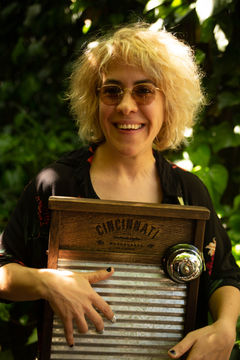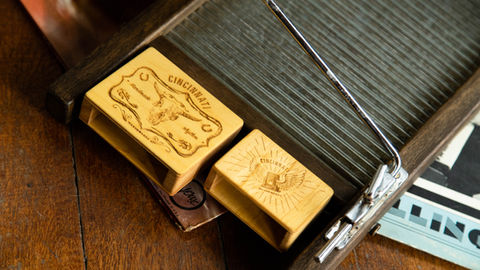
Cincinnati Washboards
By Susan Marquez


At one time, washday meant pulling out your trusted washboard and scrubbing clothes on the ridges before rinsing and hanging them to dry. A washboard was a utilitarian item, certainly nothing to get excited about. But somewhere along the way, someone ran their fingers up and down those ridges and realized it made a sound that worked well with music. Add some thimbles to your fingertips; the sound it creates is ideal for percussion.
Lucho Pellegrini comes from a musical family in Argentina. His mother taught piano, and Luchowas a percussionist. He sought out the washboard as an instrument, and he wanted to incorporate that into his music. He found one, but it was falling apart. His cousin, Rodrigo, is an engineer, so Lucho asked Rodrigo to re-engineer and improve the washboard for him to use as a musical instrument. “They started iterating and came up with what became Cincinnati Washboards,” says Tim Zenderman, who markets the washboards in the United States. “Their intention was clear from the beginning. They wanted to create an appealing washboard built for musicians. They wanted to use sustainable materials, so they decided upon Paulownia, a tree in northern Argentina that grows rapidly.”
The name “Cincinnati” is an homage to Ohio, the location of two large washboard manufacturers. “Ohio is where National and Columbus washboards are made,” says Tim, “and Cincinnati is a big city in Ohio, so Lucho named his company Cincinnati Washboards.” In 2016, the company launched in Argentina and sold its products online. The washboards sold out almost as fast as Lucho and Rodrigo could make them. “Each of the washboards is hand-crafted.”
Tim connected with the company when a mutual friend and fellow musician introduced them. “I lived in Argentina for eight years,” Tim says. “I used to follow Lucho’s band, and I actually played ukulele with some of his bandmates. I went to see his band with my girlfriend at the time (now my wife), and Lucho was playing the washboard. We loved that.” Tim’s family manufactures wind instruments. Their company, Jean Paul USA, started ten years ago. “Prior to starting his company, my dad had been a distributor for other musical brands, including Fender, Gipson, Roland, and Yamaha. I got into this space of marketing just before the pandemic. I was working on growing the brand, and I got a lot of experience helping that company grow. A mutual friend introduced me to Lucho. He wanted to expand his business into the United States. At the time, washboards were not a ‘thing,’ but Lucho’s perspective is that it is an instrument with jam blocks and cymbals that make it super customizable, and it fits in a backpack. That is mind-blowing for percussionists. Those who know the washboard usually associate it with Appalachian music or something out of New Orleans, like Dixieland jazz, Cajun, or zydeco music. But the reality is that you can play the washboard with any kind of music, and it works incredibly well in so many different spaces where percussion isn’t even really a thing, like in bluegrass, but because the washboard is much more discreet than a full drum set. It can work alongside, like an acoustic instrument, in harmony. I think it’s like such a cool instrument.”
Tim points out many reasons to prefer a washboard over a big drum set. “The first, of course, is a drum set takes up a lot of space, whereas the washboard can be tucked away in a small case. Drum sets are difficult to travel with, while the washboard is lightweight and easy to carry. It’s basically a drum set you can carry in a backpack.” And of course, a huge advantage the washboard has over a drum set is the cost. A small washboard starts at just $199. The “rusted” model is more expensive, coming in at $299 for the small version. “The washboards come with a galvanized or rusted finish,” explains Tim. “The instruments are played by tapping and draggingyour fingers over the ridges. Our rusted finish gives a ‘darker’ sound. Players can drag along the ridges for a fuller sound texture. That has never been done with washboards before. It’s a Cincinnati first.”
Learning how to play the washboard is easy. A free “get started” video is on the company’s website, www.cincinnatiwashboards.com. “We are working on a good course that will get people started playing like a pro,” says Tim.
Once you’ve mastered the washboard, you may want to add more accessories. Cincinnati Washboards offers cowbells, cymbals, and jam blocks. “The jam blocks have been very popular in the United States,” says Tim. “They are really unique.” The washboards come complete with a cowbell, shoulder strap, thimbles, and carrying case. “Because we are celebrating our entry into the U.S. market, we are offering special deals for the holidays,” says Tim. “Cincinnati Washboards can be shipped all over the world.”






























